
Instruction Manual
Stirrer High Volume STHVAL
Stirrer High Volume STHVDG
Revision 3
10/29/2020

Table of ConTenTs
Package Contents . . . . . . . . . . . . 1
Service Information . . . . . . . . . . . . 1
Installation . . . . . . . . . . . . 2
Maintenance & Servicing . . . . . . . . . . . . 2
Environmental Conditions . . . . . . . . . . . . 2
Safety Instructions . . . . . . . . . . . . 3
Standards & Regulations . . . . . . . . . . . . 3
Specifications . . . . . . . . . . . . 4
Operating Instructions - STHVAL . . . . . . . . . . . . 4
Control Panel - STHVDG . . . . . . . . . . . . 5
Operating Instructions - STHVDG . . . . . . . . . . . . 5-6
Troubleshooting - STHVDG . . . . . . . . . . . . 6
PaCkage ConTenTs
STHVAL or STHVDG High Volume Stirrer
Power cord
Stir bar
Instruction manual
1
serviCe informaTion
If the troubleshooting section does not resolve or describe your problem, contact your
authorized OHAUS service agent. For service assistance or technical support in the
United States call toll-free 1-800-672-7722 ext. 7852 between 8:00 AM and 5:00 PM EST.
An OHAUS product service specialist will be available to provide assistance. Outside the
USA, please visit our web site, www.ohaus.com to locate the Ohaus office nearest you.
Serial Number: _______________________________________________________
Date of Purchase: ____________________________________________________
Supplier: ___________________________________________________________

Upon receiving the Ohaus High Volume Stirrer, check to ensure that no damage has
occurred in shipment. It is important that any damage that occurred in transport is
detected at the time of unpacking. If you do find such damage the carrier must be
notified immediately.
After unpacking, place the High Volume Stirrer on a level bench or table, away from
explosive vapors. Ensure that the surface on which the unit is placed will withstand
typical heat produced by the unit and place the unit a minimum of six (6) inches from
vertical surfaces. Always place the unit on a sturdy work surface.
The High Volume Stirrer is supplied with a power cord that is inserted into the IEC
connector on the back of the unit first, then it can be plugged into a properly grounded
outlet. The 120V unit plugs into a 120 volt, 50/60 Hz source.
mainTenanCe & serviCing
The High Volume Stirrer is built for long, trouble-free, dependable service. No
lubrication or other technical user maintenance is required. It needs no user
maintenance beyond keeping the surfaces clean. The unit should be given the care
normally required for any electrical appliance. Avoid wetting or unnecessary exposure
to fumes. Spills should be removed promptly. Do not use a cleaning agent or solvent
on the front panel or top plate which is abrasive or harmful to plastics, nor one which
is flammable. Always ensure the power is disconnected from the unit prior to any
cleaning. If the unit ever requires service, contact your Ohaus representative.
Operating Conditions: Indoor use only.
Temperature: 5 to 40°C (41 to 104°F)
Humidity: 20% to 80% relative humidity, non-condensing
Altitude: 0 to 6,562 ft (2000 M) above sea level
Non-Operating Storage:
Temperature: -20 to 65°C (-4 to 149°F)
Humidity: 20% to 80% relative humidity, non-condensing
Installation Category II and Pollution Degree 2 in accordance with IEC 664.
* Avoid cold starts: Unit is not designed to start after being in a cold room
environment. Bring unit into cold room from a room temperature environment,
operate and remove unit from cold room as soon as operation is complete.
equiPmenT DisPosal
This equipment must not be disposed of with unsorted waste. It is your
responsibility to correctly dispose of the equipment at life-cycle-end by
handing it over to an authorized facility for separate collection and recycling.
It is also your responsibility to decontaminate the equipment in case of
biological, chemical and/or radiological contamination, so as to protect the
persons involved in the disposal and recycling of the equipment from health
hazards.
For more information about where you can drop off your waste of equipment, please
contact your local dealer from whom you originally purchased this equipment. By doing
so, you will help to conserve natural and environmental resources and you will ensure that
your equipment is recycled in a manner that protects human health.
2
insTallaTion environmenTal ConDiTions

Please read the entire instruction manual before operating the High Volume Stirrer.
WARNING! DO NOT use the High Volume Stirrer in a hazardous atmosphere
or with hazardous materials for which the unit was not designed. Also, the
user should be aware that the protection provided by the equipment may
be impaired if used with accessories not provided or recommended by the
manufacturer, or used in a manner not specified by the manufacturer.
Always operate unit on a level surface for best performance and maximum
safety.
DO NOT lift unit by the top plate.
Heavy walled glass or polypropylene container recommended when stirring
at high speeds. If stir bar de-couples at higher speeds, thin walled glass
containers may break.
CAUTION! To avoid electrical shock, completely cut off power to the unit by
disconnecting the power cord from the unit or unplug from the wall outlet.
Disconnect unit from the power supply prior to maintenance and servicing.
Spills should be removed promptly. DO NOT immerse the unit for cleaning.
DO NOT operate the unit if it shows signs of electrical or mechanical damage.
Earth Ground - Protective Conductor Terminal
Alternating Current
Ohaus hereby declares under it’s sole responsibility that the construction of this
product conforms in accordance with the following standards:
Safety standards:
IEC 61010-1 Safety requirements for electrical equipment for measurement,
control and laboratory use. Part I: General Requirements.
IEC 61010-2-051 Part II: Particular requirements for laboratory equipment for
mixing and stirring.
UL Std. No. 61010-1
EMC standards:
EN61326-1 Class A FCC-B
EN61000-3-2/3-3 EN55011 Group 1, Class A
EN61000-4-2 EN61000-4-3
EN61000-4-4 EN61000-4-5
EN61000-4-6 EN61000-4-8
EN61000-4-11
Associated EU guidelines:
EMC directive 2014/30/EU
LVD directive 2014/35/EU
RoHS directive 2015/863/EU
3
safeTy insTruCTions sTanDarDs & regulaTions

Overall dimensions (L x W x H): 17 x 11 x 4” (43.2 x 27.9 x 10.2cm)
Top plate dimensions (L x W): 12.5 x 11” (31.8 x 27.9cm)
Top plate material: glass filled nylon
Electrical (50/60 Hz): 120 volts, 1.3 amps, 75 watts
Fuses: 5mm x 20mm, 5 amp quick acting
Speed range: 60 to 1400rpm
Stability: 60 to 250rpm +/-5rpm
250 to 1400rpm +/-2%
Timer - STHVDG: 1 second to 160 hours
Maximum H2O capacity: 25L
Maximum vessel dia.: 25cm
Controls: STHVAL: stir knob, 1 to 10 dial markings
STHVDG: see page 6
Ship weight: 14.6lbs (6.6kg)
sPeCifiCaTions
4
oPeraTing insTruCTions - HigH volume sTirrer - sTHval
High Volume Stirrer - STHVAL is used for general laboratory stirring needs.
1. Getting ready:
a. The stir knob has a built in on-off switch at its extreme counter-clockwise position.
Turn the stir knob to the off position. Plug the power cord into a properly grounded
outlet.
b. Place a stir bar into each vessel to be stirred.
c. Place the vessel to be stirred, with contents, onto the center of the stirring position
on the top plate. This is important for stirring because the stir bar will be well within
the magnetic field.
2. Turning unit on:
a. From the off position, turn the stir knob clockwise until a click is heard, then
continue turning until the desired speed is obtained. The microprocessor speed
control slowly brings the sample to set speed to avoid splashing. The maximum
speed is at the extreme clockwise position of the knob.
3. Setting speed:
a. When stirring has begun, the desired speed may be obtained by carefully turning
the knob clockwise or counter-clockwise until reaching the desired speed. The
micro-processor also monitors and regulates the stirring speed, sensing your
requirements whether stirring an aqueous, viscous or semi-solid solution.
4. Turning unit off:
a. To stop stirring function, turn the stir knob to the extreme counter-clockwise
position. The stirrer should be kept in the off position when not in use. To
completely cut off power to the unit, disconnect the power cord from the unit or
un-plug from the wall outlet.
OPERATING TIPS
The stirrer increases speed at a steady rate until the set-point is reached. If the stir bar is
too large or the liquid is too viscous, the stirrer may not reach its set-point. The set-point
speed needs to be reduced. Use stir bar supplied with the unit for optimal performance.

5
ConTrol Panel - HigH volume sTirrer - sTHvDg
B.
F.
C.
D.
A.
E.
The front panel of the High Volume Stirrer - STHVDG contains all the controls and
displays needed to operate the unit.
A. Standby button/standby indicator light: The standby indicator light will illuminate
when the unit is plugged in. The unit will be in standby mode. Press the standby
button to activate the speed and time functions. The standby indicator light will shut
off and the speed display and time display will illuminate. Press the standby button
again and the unit will once again be in standby mode.
B. Speed display: Displays the speed of the stirrer. C. Up/down arrows for set-point
control. On/off button starts/stops stir function. D. The speed indicator light will be
illuminated when the unit is stirring.
E. Time display: Displays accumulated time (continuous mode) or how much time
is remaining (timed mode). F. Up/down arrows for set-point control. On/off button
starts/stops the time function. The display range is from 0 to 9,999 minutes in one
(1) second increments. The display will indicate minutes and seconds until the timer
reaches 99 minutes and 59 seconds (99:59), then the display will automatically
display minutes up to 9,999.
oPeraTing insTruCTions - HigH volume sTirrer - sTHvDg
The High Volume Stirrer - STHVDG has been designed for the speed and time
functions to work independently of one another. The speed can be re-set without
re-setting the timer and the timer can be stopped and started without interrupting the
stirring function.
1. Getting ready:
a. Plug the power cord into a properly ground outlet. The standby indicator light
will illuminate, verifying power to the unit.
b. Place a stir bar into the vessel to be stirred.
c. Place the vessel, with contents, onto the center of the stirring position on the
top plate. This is important for stirring because the stir bar will be well within the
magnetic field.
d. Press the standby button to move the unit from standby mode. The standby
indicator light will turn off and the speed/time displays will illuminate and display
the previously used settings.
2. Setting speed:
a. Press the up/down arrows below the speed display until you reach the desired
speed. When you release the arrow button, the display will blink off and then
on indicating the new set speed has been accepted.
b. Press the on/off button to start the stirring function. The indicator light below
the speed display will illuminate to indicate the stirring function is in-use and
will remain lit until stirring has ceased. The microprocessor controlled ramping
feature slowly increases speed until the set-point is reached which helps to avoid
splashing and provides excellent low end control. The microprocessor also
regulates the stirring speed, sensing
your requirements whether stirring an aqueous, viscous or semi-solid solution.
c. Speed adjustments can be made without interrupting stirring by using the up/down
arrows below the speed display. After the change has been made and you
release the arrow button, the display will blink off and then on indicating the
new set speed has been accepted.
d. To stop the stirring function, press the on/off button below the speed display.

6
3. Setting time to zero (0:00) and continuous mode: Accumulated time.
a. Press and hold the on/off button below the time display. After three (3) seconds,
the display will indicate the previous set time.
b. Simultaneously press both the up and down arrows, the display will indicate
zero (0:00). The unit time is now set to zero (0:00) minutes. Alternately, you can
use the up/down arrows to get to zero (0:00).
c. Press the on/off button below the time display. The display will indicate the
accumulated time. The up/down arrows will become inactive. To stop timer,
press the on/off button again. IMPORTANT: This will NOT interrupt the stirring
function. Press the on/off button below the speed display to interrupt the stirring
function.
d. To re-set, press and hold the on/off button below the time display. After three (3)
seconds, the display will indicate the previous set time, which was zero (0:00).
4. Setting timed mode: Programmed time.
a. Press the up/down arrows below the time display until you reach the desired
time.
b. Start this function by pressing the on/off button below the time display. The unit
will run for the selected time, the up/down arrows will become inactive while the
timer is running. The unit will stop stirring when the time display reaches zero
(0:00). Four (4) audible beeps will indicate the time down function is complete.
The time display will default back to the set time. To repeat for the same time,
simply depress the on/off button again.
c. To interrupt an automatic timing cycle before it is completed, press the on/off
button below the time display. The display will flash off and on to indicate the
time function is on “hold”. IMPORTANT: This will NOT interrupt the stirring
function. Press the on/off button below the speed display to interrupt the stirring
function. Restart the timer by pressing the on/off button below the time display,
unit will continue counting down to zero (0:00). When the display reaches zero
(0:00), you will hear the four (4) audible beeps that indicate the time down
function is complete and stirring function will cease.
oPeraTing insTruCTions - HigH volume sTirrer - sTHvDg
5. Turning unit off:
a. To turn the unit off, press the standby button. The speed and time displays
will be blank, the standby indicator light will illuminate. The stirrer should be
kept in standby mode when not in use. To completely cut off power to the unit,
disconnect the power cord from the unit or un-plug from the wall outlet.
OPERATING TIPS
Built-in memory maintains the last used speed and time settings during a power
interruption.
The stirrer increases speed at a steady rate until the set-point is reached, if the stir
bar is too large or the liquid is too viscous, the stirrer may not reach its set-point. The
set-point speed needs to be reduced. Use stir bar supplied with the unit for optimal
performance.
The following errors should NOT be address by the user. If any of these errors appear,
contact your Ohaus representative for repairs.
The following errors should NOT be address by the user. If any of these errors appear,
contact your Ohaus representative for repairs.
Error Code Software Test Cause
E03 motor system failure - rotor locked
- motor failure
- motor sensor failure
- magnetic material placed near or on the
top plate surface
TroublesHooTing - HigH volume sTirrer - sTHvDg

Manual de instrucciones
Agitador de alto volumen STHVAL
Agitador de alto volumen STHVDG
Revision 3
10/29/2020

ÍnDiCe
Contenido del paquete . . . . . . . . . . . . 9
Información de servicio . . . . . . . . . . . . 9
Instalación . . . . . . . . . . . . 10
Mantenimiento y servicio . . . . . . . . . . . . 10
Condiciones ambientales . . . . . . . . . . . . 10
Instrucciones de seguridad . . . . . . . . . . . . 11
Normas y reglamentos . . . . . . . . . . . . 11
Especificaciones . . . . . . . . . . . . 12
Manual de instrucciones - STHVAL . . . . . . . . . . . . 12
Panel de control - STHVDG . . . . . . . . . . . . 13
Manual de instrucciones - STHVDG . . . . . . . . . . . . 13-14
Solución de problemas - STHVDG . . . . . . . . . . . . 14
ConTeniDo Del PaqueTe
Agitador de alto volumen STHVAL o STHVDG
Cable de alimentación
Barra de revuelto
Manual de instrucciones
9
informaCión De serviCio
Si la sección de resolución de problemas no resuelve o no describe su problema,
póngase en contacto con su agente de servicio autorizado de OHAUS. Para obtener
asistencia de servicio o soporte técnico en Estados Unidos, llame al número gratuito
1-800-672-7722 ext. 7852 entre las 8:00 a.m. y las 5:00 p.m., hora del este.
Un especialista en servicio de productos de OHAUS estará disponible para proporcio-
narle asistencia. Fuera de los Estados Unidos, visite nuestro sitio web, www.ohaus.com
para localizar la oficina de Ohaus más cercana a usted.
Número de serie: _______________________________________________________
Fecha de compra: ____________________________________________________
Proveedor: ___________________________________________________________

Al recibir el agitador de alto volumen de Ohaus, compruebe que no se ha producido
ningún daño en el envío. Es importante que cualquier daño que haya ocurrido en el
transporte sea detectado al momento de desempacar. Si encuentra tales daños, el
transportista debe ser notificado inmediatamente.
Después de desembalar, coloque el Agitador de Alto Volumen en un banco o mesa
nivelada, lejos de vapores explosivos. Asegúrese de que la superficie sobre la que se
coloca la unidad resista el calor típico producido por la unidad y coloque la unidad a un
mínimo de seis (6) pulgadas de las superficies verticales. Coloque siempre la unidad
sobre una superficie de trabajo resistente.
El agitador de alto volumen se suministra con un cable de alimentación que se inserta
primero en el conector IEC de la parte posterior de la unidad, y luego se puede conectar
a una toma de corriente debidamente conectada a tierra. La unidad de 120V se conecta
a una fuente de 120 voltios, 50/60 Hz. La unidad de 230V se enchufa a una fuente de
230 voltios, 50/60 Hz.
manTenimienTo y serviCio
El Agitador de Alto Volumen está construido para un servicio largo, sin problemas
y confiable. No requiere lubricación ni otro tipo de mantenimiento técnico por parte
del usuario. No necesita mantenimiento por parte del usuario más allá de mantener
las superficies limpias. La unidad debe recibir los cuidados que normalmente se
requieren para cualquier aparato eléctrico. Evite la humectación o la exposición
innecesaria a los vapores. Los derrames deben ser eliminados rápidamente. No
utilice un agente de limpieza o disolvente en el panel frontal o en la placa superior
que sea abrasivo o dañino para los plásticos, ni uno que sea inflamable. Asegúrese
siempre de que la alimentación esté desconectada de la unidad antes de cualquier
limpieza. Si en algún momento la unidad requiere mantenimiento, póngase en
contacto con su representante de Ohaus.
Condiciones de operación: Sólo para uso en interiores.
Temperatura: 5 a 40°C (41 a 104°F)
Humedad: 20% a 80% de humedad relativa, sin condensación
Altitud: 0 a 6,562 ft (2000 M) sobre el nivel del mar
Almacenamiento no operativo:
Temperatura: -20 a 65°C (-4 a 149°F)
Humedad: 20% to 80% de humedad relativa, sin condensación
Categoría de Instalación II y Grado de Contaminación 2 de acuerdo con la IEC 664.*
* Evite los arranques en frío: La unidad no está diseñada para arrancar después de
estar en un ambiente de cámara frigorífica. Lleve la unidad a una cámara frigorífica
desde un ambiente a temperatura ambiente, opere y retire la unidad de la cámara
frigorífica tan pronto como se haya completado la operación.
eliminaCión Del equiPo
Este equipo no debe ser eliminado con los residuos sin clasificar. Es
su responsabilidad eliminar correctamente el equipo al final de su vida
útil entregándolo a un centro autorizado para su recogida y reciclaje
por separado. También es su responsabilidad descontaminar el equipo
en caso de contaminación biológica, química y/o radiológica, para
proteger de los peligros para la salud a las personas que participan en
la eliminación y el reciclaje del equipo.
Para obtener más información sobre dónde puede dejar los residuos del equipo,
póngase en contacto con el distribuidor local al que compró el equipo originalmente.
De este modo, ayudará a conservar los recursos naturales y medioambientales y
se asegurará de que el equipo se recicle de forma que se proteja la salud humana.
10
insTalaCión ConDiCiones ambienTales

Por favor, lea todo el manual de instrucciones antes de operar el agitador de
alto volumen.
ADVERTENCIA! NO utilice el agitador de alto volumen en una atmósfera peligrosa
o con materiales peligrosos para los que no haya sido diseñado. Además, el usuario
debe tener en cuenta que la protección que ofrece el equipo puede verse afectada si
se utiliza con accesorios no proporcionados o recomendados por el fabricante, o si se
utiliza de una manera no especificada por el fabricante.
Haga funcionar siempre la unidad en una superficie plana para obtener el mejor
rendimiento y la máxima seguridad.
NO levante la unidad por la placa superior.
Se recomienda utilizar un recipiente de vidrio o polipropileno de paredes gruesas
cuando se agita a altas velocidades. Si la barra de agitación se desacopla a
velocidades más altas, los contenedores de vidrio de paredes finas pueden romperse.
PRECAUCIÓN! Para evitar descargas eléctricas, corte completamente la alimentación
de la unidad desconectando el cable de alimentación de la unidad o desenchufándolo
de la toma de corriente. Desconecte la unidad de la fuente de alimentación antes de
realizar cualquier tipo de mantenimiento o reparación.
Los derrames deben ser eliminados inmediatamente. NO sumerja la unidad para su
limpieza.
NO haga funcionar la unidad si muestra signos de daños eléctricos o mecánicos.
Conexión a tierra - Terminal del conductor de protección
Corriente alterna
Ohaus declara bajo su exclusiva responsabilidad que la construcción de este
producto se ajusta a las siguientes normas:
Normas de seguridad:
IEC 61010-1 1 Requisitos de seguridad para equipos eléctricos de medición,
control y uso en laboratorio. Parte I: Requisitos generales.
IEC 61010-2-051 IEC 61010-2-051 Parte II: Requisitos particulares para equipos de
laboratorio para mezcla y agitación.
UL Std. No. 61010-1
Estándares EMC:
EN61326-1 Class A FCC-B
EN61000-3-2/3-3 EN55011 Grupo 1, Clase A
EN61000-4-2 EN61000-4-3
EN61000-4-4 EN61000-4-5
EN61000-4-6 EN61000-4-8
EN61000-4-11
Directrices de la UE asociadas:
Directiva EMC 2014/30/EU
Directiva LVD 2014/35/EU
Directiva RoHS 2015/863/EU
11
insTruCCiones De seguriDaD normas y reglamenTos

Dimensiones totales (L x W x H): 17 x 11 x 4” (43,2 x 27,9 x 10,2cm)
Dimensiones de la placa superior (L x W): 12.5 x 11” (31,8 x 27,9cm)
Material de la placa superior: nylon relleno de vidrio
Eléctrico (50/60 Hz): 120 voltios, 1,3 amperios, 75 vatios
230 voltios, 0,65 amperios, 75 vatios
Fusibles: 5mm x 20mm, 5 amperios de acción rápida
Rango de velocidad: 60 a 1400rpm
Estabilidad: 60 a 250rpm +/-5rpm
250 a 1400rpm +/-2%
Temporizador - STHVDG: 1 segundo a 160 horas
Capacidad máxima de H2O: 25L
Diámetro máximo del vaso: 25cm
Controles:STHVAL: Perilla de agitación, de 1 a 10 marcas de dial
STHVDG: see page 6
Peso del envío: 14.6lbs (6,6kg)
esPeCifiCaCiones
12
manual De insTruCCiones - sTHval
Agitador de alto volumen - El STHVAL se utiliza para las necesidades generales de agitación en
el laboratorio.
1. Preparándose:
a. La perilla de agitación tiene un interruptor incorporado de encendido y apagado en su posición
extrema en sentido contrario a las agujas del reloj. Gire la perilla de agitación a la posición de
apagado. Enchufe el cable de alimentación en una toma de corriente con conexión a tierra
adecuada.
b. Coloque una barra de agitación en cada recipiente que vaya a agitar.
c. Coloque el recipiente que va a ser agitado, con su contenido, en el centro de la posición de
agitación en la placa superior. Esto es importante para la agitación porque la barra de agitación
estará bien dentro del campo magnético.
2. Encienda la unidad:
a. Desde la posición de apagado, gire la perilla de agitación en el sentido de las agujas del reloj
hasta que se escuche un clic, luego continúe girando hasta obtener la velocidad deseada. El
control de velocidad del microprocesador lleva lentamente la muestra a la velocidad establecida
para evitar salpicaduras. La velocidad máxima se encuentra en la posición extrema de la perilla en
el sentido de las agujas del reloj.
3. Ajuste de la velocidad:
a. Cuando se ha iniciado la agitación, se puede obtener la velocidad deseada girando
cuidadosamente la perilla en el sentido de las agujas del reloj o en sentido contrario hasta alcanzar
la velocidad deseada. El microprocesador también controla y regula la velocidad de agitación,
detectando sus requerimientos ya sea que se esté agitando una solución acuosa, viscosa o
semisólida.
4. Apagar la unidad:
a. Para detener la función de agitación, gire la perilla de agitación hasta la posición extrema en
sentido contrario a las agujas del reloj. El agitador debe mantenerse en la posición de apagado
cuando no esté en uso. Para cortar completamente la alimentación de la unidad, desconecte el
cable de alimentación de la unidad o desenchúfelo de la toma de corriente.
CONSEJOS DE FUNCIONAMIENTO
El agitador aumenta la velocidad a un ritmo constante hasta que se alcanza el punto establecido.
Si la barra de agitación es demasiado grande o el líquido es demasiado viscoso, es posible que
el agitador no alcance su punto de ajuste. Es necesario reducir la velocidad del punto de ajuste.
Utilice la barra de agitación suministrada con la unidad para obtener un rendimiento óptimo.

13
Panel De ConTrol - sTHvDg
B.
F.
C.
D.
A.
E.
El panel frontal del agitador de alto volumen - STHVDG contiene todos los controles y
pantallas necesarios para operar la unidad.
A. Botón de Standby/luz indicadora de espera: La luz indicadora de espera se iluminará
cuando la unidad esté enchufada. La unidad estará en modo de espera. Pulse el botón
de Stanby para activar las funciones de velocidad y tiempo. La luz indicadora del modo
de espera se apagará y se iluminará la pantalla de velocidad y la pantalla de tiempo.
Vuelva a pulsar el botón de Standby y la unidad volverá a estar en modo de espera.
B. Pantalla de velocidad: Muestra la velocidad del agitador. C. Flechas arriba/abajo para
el control del punto de ajuste. El botón de encendido/apagado inicia/para la función de
agitación. D. La luz indicadora de velocidad se iluminará cuando la unidad esté agitando.
E. Indicador de tiempo: Muestra el tiempo acumulado (modo continuo) o el tiempo
restante (modo temporizado). F. Flechas arriba/abajo para el control del punto de
ajuste. El botón de encendido/apagado inicia/para la función de tiempo. El rango de
visualización va de 0 a 9.999 minutos en incrementos de un (1) segundo. La pantalla
indicará los minutos y los segundos hasta que el temporizador alcance los 99 minutos
y 59 segundos (99:59), luego la pantalla mostrará automáticamente los minutos hasta
9.999.
manual De insTruCCiones - sTHvDg
El agitador de alto volumen - STHVDG ha sido diseñado para que las funciones de velocidad
y tiempo funcionen independientemente una de la otra. La velocidad puede ser reajustada
sin reajustar el temporizador y el temporizador puede ser detenido y puesto en marcha sin
interrumpir la función de agitación.
1. Preparándose:
a. Enchufe el cable de alimentación en una toma de tierra adecuada. La luz
indicadora de espera se iluminará, verificando la alimentación de la unidad.
b. Coloque una barra de agitación en el recipiente que se va a agitar.
c. Coloque el recipiente, con su contenido, en el centro de la posición de agitación en la placa
superior. Esto es importante para la agitación porque la barra de agitación estará bien dentro
del campo magnético.
d. Presione el botón de espera para mover la unidad desde el modo de espera. La luz indicadora
del modo de espera se apagará y las pantallas de velocidad/tiempo se iluminarán y mostrarán
los ajustes utilizados anteriormente.
2. Ajuste de la velocidad:
a. Presione las flechas arriba/abajo debajo de la pantalla de velocidad hasta que alcance
la velocidad deseada. Cuando suelte el botón de la flecha, la pantalla parpadeará de forma
intermitente para indicar que se ha aceptado la nueva velocidad establecida.
b. Presione el botón de encendido/apagado para iniciar la función de agitación. La luz indicadora
debajo de la pantalla de velocidad se iluminará para indicar que la función de agitación está
en uso y permanecerá encendida hasta que la agitación haya cesado. La función de agitación
controlada por el microprocesador aumenta lentamente la velocidad hasta que se alcanza el
punto de ajuste, lo que ayuda a evitar las salpicaduras y proporciona un excelente control de la
parte inferior. El microprocesador también regula la velocidad de agitación, detectando
sus requerimientos ya sea agitando una solución acuosa, viscosa o semisólida.
c. Los ajustes de velocidad pueden hacerse sin interrumpir la agitación utilizando las flechas
arriba/abajo debajo de la pantalla de velocidad. Después de que se haya hecho el cambio y se
suelte el botón de la flecha, la pantalla parpadeará para indicar que se ha aceptado el nuevo
ajuste de velocidad.
d. Para detener la función de agitación, presione el botón de encendido/apagado debajo de la
pantalla de velocidad.

14
3. Ajustando el tiempo a cero (0:00) y el modo continuo: Tiempo acumulado.
a. Mantenga pulsado el botón de encendido/apagado situado debajo de la pantalla de la hora.
Después de tres (3) segundos, la pantalla indicará el tiempo previamente ajustado.
b. Presione simultáneamente las flechas arriba y abajo, la pantalla indicará cero (0:00). La
unidad de tiempo está ahora ajustada a cero (0:00) minutos. Alternativamente, puede usar las
flechas arriba/abajo para llegar a cero (0:00).
c. Presione el botón de encendido/apagado debajo de la pantalla de la hora. La pantalla indicará
el tiempo acumulado. Las flechas arriba/abajo se desactivarán. Para detener el temporizador,
presione el botón de encendido/apagado nuevamente. IMPORTANTE: Esto NO interrumpirá
la función de agitación. Presione el botón de encendido/apagado debajo de la pantalla de
velocidad para interrumpir la función de agitación.
d. Para volver a ajustar, mantenga pulsado el botón de encendido/apagado debajo de la pantalla
de tiempo. Después de tres (3) segundos, la pantalla indicará la hora ajustada anteriormente,
que era cero (0:00).
4. Ajuste del modo de tiempo: Hora programada.
a. Presione las flechas arriba/abajo debajo de la pantalla de la hora hasta que llegue a la hora
deseada. b. Inicie esta función pulsando el botón de encendido/apagado debajo de la pantalla
de la hora. La unidad funcionará durante el tiempo seleccionado, las flechas arriba/abajo se
desactivarán mientras el temporizador esté en funcionamiento. La unidad dejará de agitarse
cuando la pantalla de tiempo llegue a cero (0:00). Cuatro (4) pitidos audibles indicarán que
se ha completado la función de reducción del tiempo. La pantalla de tiempo volverá a la hora
establecida por defecto. Para repetir el mismo tiempo, simplemente vuelva a pulsar el botón de
encendido/apagado.
c. Para interrumpir un ciclo de temporización automática antes de que se complete, presione
el botón de encendido/apagado debajo de la pantalla de tiempo. La pantalla se apagará y
encenderá de manera intermitente para indicar que la función de tiempo está en “espera”.
IMPORTANTE: Esto NO interrumpirá la función de agitación. Pulse el botón de encendido/
apagado debajo de la pantalla de velocidad para interrumpir la función de agitación. Reinicie
el temporizador pulsando el botón de encendido/apagado debajo de la pantalla de tiempo, la
unidad continuará la cuenta atrás hasta cero (0:00). Cuando la pantalla llegue a cero (0:00),
escuchará los cuatro (4) pitidos audibles que indican que la función de reducción del tiempo está
completa y la función de agitación cesará.
manual De insTruCCiones - sTHvDg
5. Apagando la unidad:
a. Para apagar la unidad, pulse el botón de espera. Las pantallas de velocidad y tiempo estarán
en blanco, la luz indicadora de espera se iluminará. El agitador debe mantenerse en el modo
de espera cuando no esté en uso. Para cortar completamente la alimentación de la unidad,
desconecte el cable de alimentación de la unidad o desenchúfelo de la toma de corriente.
CONSEJOS DE FUNCIONAMIENTO
La memoria incorporada mantiene los últimos ajustes de velocidad y tiempo utilizados durante
una interrupción de energía.
El agitador aumenta la velocidad a un ritmo constante hasta que se alcanza el punto de ajuste,
si la barra de agitación es demasiado grande o el líquido es demasiado viscoso, es posible que
el agitador no alcance su punto de ajuste. Es necesario reducir la velocidad del punto de ajuste.
Utilice la barra de agitación suministrada con la unidad para obtener un rendimiento óptimo.
Los siguientes errores NO deben ser abordados por el usuario. Si aparece alguno de estos
errores, póngase en contacto con su representante de Ohaus para su reparación.
Los siguientes errores NO deben ser abordados por el usuario. Si aparece alguno de
estos errores, contacte con su representante de Ohaus para su reparación.
Código de error Prueba de software Causa
E03 Fallo en el sistema de motor rotor locked
motor failure
motor sensor failure
magnetic material placed
near or on the top plate surface
soluCión De Problemas - sTHvDg

Ohaus Corporation
7 Campus Drive
Suite 310
Parsippany, NJ 07054 USA
Tel: +1 (973) 377-9000
Fax: +1 (973) 944-7177
With ofces worldwide.
www.ohaus.com
30570470
SAP P/N: 30570470B
P/N: 786222-00 Rev3
© 2020 OHAUS Corporation, all rights reserved
-
 1
1
-
 2
2
-
 3
3
-
 4
4
-
 5
5
-
 6
6
-
 7
7
-
 8
8
-
 9
9
-
 10
10
-
 11
11
-
 12
12
-
 13
13
-
 14
14
-
 15
15
Ohaus STHVDG Manual de usuario
- Tipo
- Manual de usuario
- Este manual también es adecuado para
en otros idiomas
- English: Ohaus STHVDG User manual
Artículos relacionados
Otros documentos
-
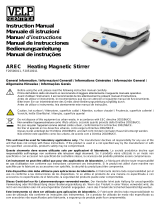 VELP Scientific F20510011 El manual del propietario
VELP Scientific F20510011 El manual del propietario
-
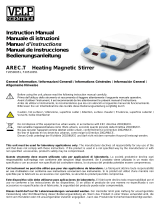 VELP Scientific F20510051 El manual del propietario
VELP Scientific F20510051 El manual del propietario
-
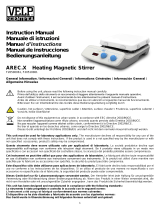 VELP Scientific SA20510061 El manual del propietario
VELP Scientific SA20510061 El manual del propietario
-
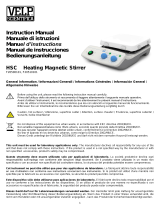 VELP Scientific F20500101 El manual del propietario
VELP Scientific F20500101 El manual del propietario
-
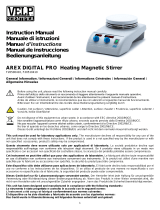 VELP Scientific VSI-SC20510410 El manual del propietario
VELP Scientific VSI-SC20510410 El manual del propietario
-
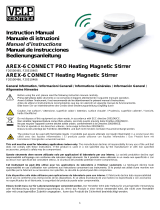 VELP Scientific VSI-SA20500465 El manual del propietario
VELP Scientific VSI-SA20500465 El manual del propietario




















